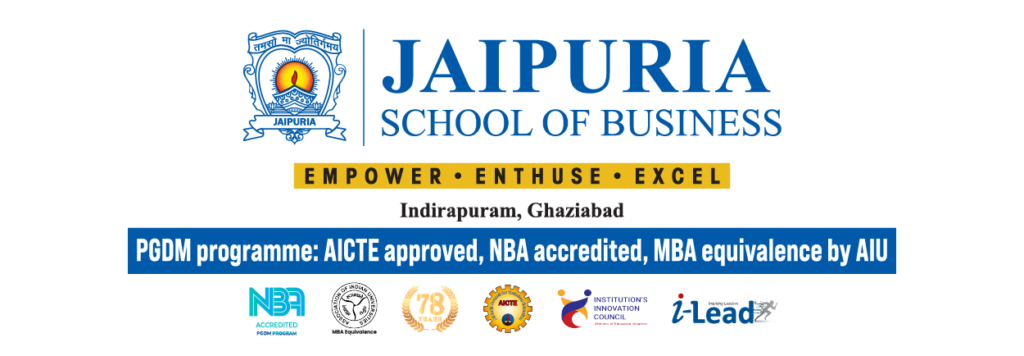Introduction:
In an era characterized by increasing social and environmental challenges, businesses are under growing pressure to go beyond profit maximization and contribute to the well-being of society. Corporate Social Responsibility (CSR) has emerged as a guiding principle for businesses seeking to integrate social and environmental considerations into their operations and decision-making processes. At JSB Ghaziabad, One of the Best PGDM Colleges in the NCR, scholars and practitioners are at the forefront of exploring innovative approaches to CSR and driving meaningful social impact through business initiatives.
Understanding Corporate Social Responsibility:
Corporate Social Responsibility (CSR) refers to the ethical and responsible conduct of businesses, whereby they voluntarily take into account the social, environmental, and economic impacts of their operations and engage in activities that contribute to the well-being of society. At JSB, premier PGDM colleges in the NCR, CSR is not viewed as a mere philanthropic gesture but as a strategic imperative that aligns business objectives with societal needs and expectations. Through CSR initiatives, businesses can create shared value for all stakeholders while addressing pressing social and environmental challenges.
Strategies for Effective CSR:
Effective CSR requires a strategic approach that goes beyond ad-hoc philanthropy and integrates social and environmental considerations into the core business strategy. Leading PGDM colleges in the region, students learn about the various strategies and frameworks for implementing CSR initiatives, including:
- Stakeholder Engagement: Engaging with stakeholders, including employees, customers, communities, and investors, is essential for understanding their needs, expectations, and concerns. By soliciting feedback and involving stakeholders in decision-making processes, businesses can build trust, foster collaboration, and co-create value that benefits all parties involved.
- Sustainability Integration: Embedding sustainability principles into business operations is critical for minimizing negative environmental impacts and maximizing positive social outcomes. From reducing carbon emissions and conserving natural resources to promoting ethical labor practices and supply chain transparency, businesses can integrate sustainability into their business processes and value chain to drive long-term value creation.
- Social Innovation: Embracing social innovation involves leveraging business resources, expertise, and networks to address societal challenges in innovative and impactful ways. At premier PGDM colleges in the NCR, students are encouraged to explore innovative business models, products, and services that create positive social impact while generating financial returns.
- Community Development: Investing in community development initiatives, such as education, healthcare, and infrastructure, is a key component of CSR strategies. By supporting local communities and empowering marginalized groups, businesses can contribute to poverty alleviation, social inclusion, and economic development, ultimately creating a more equitable and sustainable society.
- Ethical Governance: Promoting ethical governance and transparency is essential for building trust and credibility with stakeholders. At leading PGDM colleges, students learn about the importance of ethical leadership, integrity, and accountability in driving CSR initiatives and upholding corporate values and principles.
Impact Measurement and Reporting:
Measuring the impact of CSR initiatives is crucial for assessing their effectiveness, identifying areas for improvement, and communicating outcomes to stakeholders. At JSB, scholars and practitioners employ various methods and tools for measuring social impact, including social return on investment (SROI), impact assessments, and sustainability reporting frameworks such as the Global Reporting Initiative (GRI) and the United Nations Sustainable Development Goals (SDGs). By transparently reporting on CSR performance and outcomes, businesses can enhance accountability, build credibility, and inspire trust among stakeholders.
Best Practices:
JSB Ghaziabad and leading PGDM colleges in the region serve as hubs of knowledge and innovation, showcasing best practices and case studies of successful CSR initiatives that drive social impact. From Tata Group’s community development programs to Hindustan Unilever’s sustainability initiatives and Infosys Foundation’s philanthropic efforts, businesses across sectors are demonstrating their commitment to CSR and making a meaningful difference in the lives of people and communities. By learning from these examples and applying lessons learned, students can gain valuable insights into effective CSR strategies and contribute to creating positive social change in their future careers.
Challenges and Opportunities:
Despite the growing importance of CSR, businesses face numerous challenges in effectively implementing CSR initiatives. From resource constraints and competing priorities to stakeholder expectations and regulatory compliance, businesses must navigate a complex landscape of challenges and opportunities. However, these challenges also present opportunities for innovation, collaboration, and leadership in driving social impact. By embracing CSR as a strategic imperative and integrating social and environmental considerations into business decision-making, businesses can create value for society while securing their long-term sustainability and competitiveness.
Conclusion:
In conclusion, Corporate Social Responsibility (CSR) holds immense potential for businesses to drive positive social change and create shared value for all stakeholders. Through initiatives and perspectives at JSB Ghaziabad, One of the Best PGDM college in the NCR, businesses are exploring innovative approaches to CSR and demonstrating their commitment to ethical and responsible business practices. By integrating CSR into their core business strategy, businesses can contribute to building a more equitable, inclusive, and sustainable society, ultimately realizing their full potential as agents of positive change.

